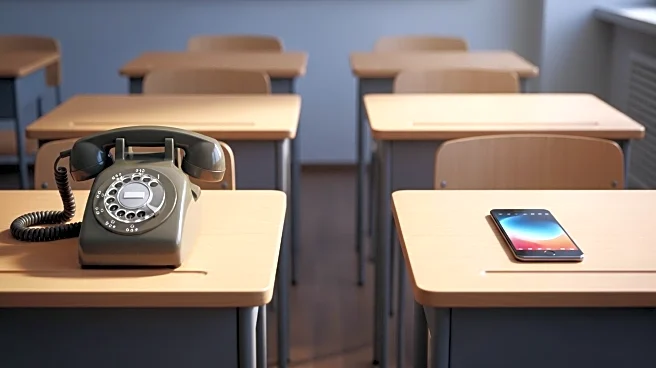What is the story about?
What's Happening?
A recent examination of cellphone use among teachers reveals a generational divide that is impacting school culture. Younger millennial teachers, who grew up with digital technology, often use their phones for personal well-being and connectivity during breaks. This contrasts with older generations who may view such use as unprofessional. The issue came to light when a millennial teacher was indirectly reprimanded for using her phone during lunch, highlighting a broader tension between generational norms and school policies. Schools are increasingly implementing strict cellphone bans to improve student focus, but these policies are also affecting staff dynamics, leading to a cultural clash over what constitutes professionalism and appropriate phone use.
Why It's Important?
The generational divide in cellphone use among teachers underscores a significant cultural shift in the workplace. As schools enforce stricter cellphone policies, they risk alienating younger staff who view digital connectivity as integral to their daily lives. This tension could lead to decreased job satisfaction and retention among millennial teachers, who may feel undervalued or misunderstood. The broader implication is a potential disruption in school culture, where the focus on compliance may overshadow the need for a supportive and inclusive environment. Understanding and addressing these generational differences is crucial for school leaders to maintain a cohesive and effective teaching staff.
What's Next?
School leaders may need to reconsider how cellphone policies are communicated and enforced to bridge the generational gap. This could involve open dialogues about the role of digital technology in teachers' lives and finding a balance between policy enforcement and personal autonomy. By fostering a culture of understanding and respect, schools can ensure that all staff members feel valued and supported, potentially leading to improved morale and collaboration. Additionally, schools might explore alternative strategies to address student focus without inadvertently creating staff tensions.
Beyond the Headlines
The issue of cellphone use among teachers reflects broader societal changes in how different generations perceive technology and work-life balance. As digital natives enter the workforce, traditional notions of professionalism are being challenged, prompting organizations to adapt to new cultural norms. This shift highlights the need for flexible policies that accommodate diverse perspectives and promote inclusivity. The situation also raises questions about the role of mental health and personal well-being in professional settings, emphasizing the importance of creating environments where employees can thrive both personally and professionally.
















